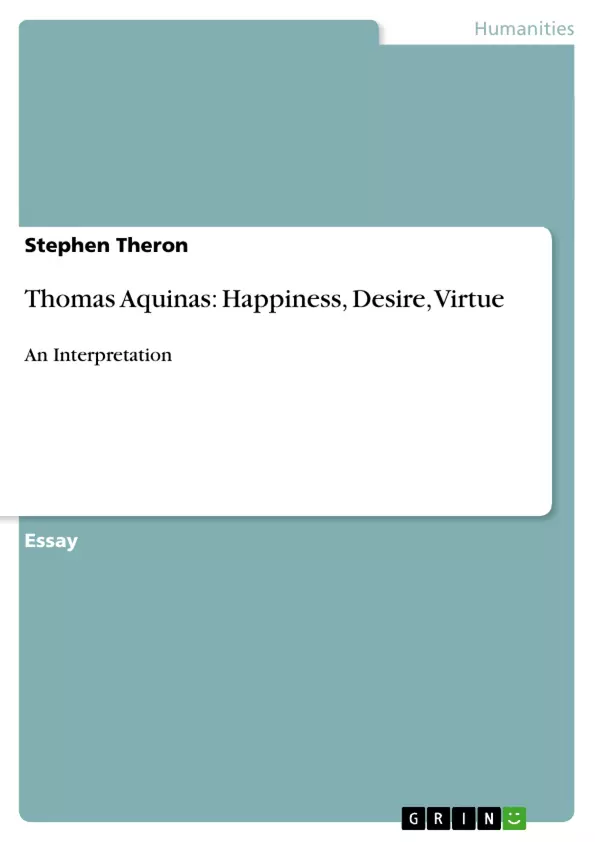The crisis of ethics in our time calls for a synoptic view capable of kindling confident teleological motivation, in persons and societies. It is futile to search for the "clear and distinct idea" in a field of such universal importance as ethics, for which the ordinary discourse of humanity is well suited. Rather, our notions must be open, open to the analogies in things and situations, and open too to the real human situation in all its depth and breadth, such things as the desires of the human heart, the burdens of finitude, misfortune and death, the polarization of the sexes, the insights and traditions of religion, the exigences of politics, the compelling witness of the arts and of literature.
The reason for this universal importance, such that a field of discourse considered especially intractable or even, recently, "queer" (J.L. Mackie), cannot be isolated as if somehow less scientific and hence inherently problematical or "emotive", was clearly stated by Aristotle when founding this science, this theoria of praxis. It is that ethics is concerned with the nature and end of man, with man, that is, in view of his characteristic action or praxis. That is to say, to take the short way for the present, it is the science of human happiness, of how to be happy. But this is the object of all human endeavour without exception. Hence, if its content be ever identified, e.g. as the vision of God, then it will follow that this content is the ultimate aim of all our civil and social arrangements, a conclusion that St. Thomas unhesitatingly draws.1
1 Summa contra gentiles III 37.
Inhaltsverzeichnis (Table of Contents)
- Introduction: Inclinations and Beatitude
- Ethics
- Human Acts
- Finis Ultimus
- Teleology
- The Virtues
- Duty, Obligation, Law
- Morals and Metaphysics: Fact and Value
- What is Law?
- Natural Law in St. Thomas's Thought
- Natural Law: Other Views
- Does Morality Require a Divine Law-Giver?
- Conscience
- The Intellectual Virtues
- The Moral Virtues
- The Cardinal Virtues
- The Theological Virtues
- Natural Law and the Acts of the Virtues
- Prudence: The Unity of the Virtues
- A Fourfold Scheme
- Justice: Legal and Moral Debt
- Fortitude: The Example of Audacity
- Temperance and the Bonum Honestum
- Natural Inclinations and Their Order
Zielsetzung und Themenschwerpunkte (Objectives and Key Themes)
This work aims to present a comprehensive interpretation of St. Thomas Aquinas's thought on happiness, desire, and virtue. It explores the concept of natural law and its relationship to human inclinations, moral virtues, and the ultimate good. The key themes explored in this text are:- The concept of human happiness as the ultimate end of human action
- The role of natural inclinations in guiding human action and shaping moral behavior
- The relationship between natural law and divine law in shaping morality
- The significance of the virtues, particularly the cardinal virtues, in achieving human flourishing
- The practical application of Thomistic ethics in contemporary society
Zusammenfassung der Kapitel (Chapter Summaries)
The introduction explores the crisis of ethics in contemporary society and the importance of a teleological approach to moral motivation. It emphasizes the role of natural inclinations and the search for ultimate happiness in shaping human action. Chapters 1 through 5 delve into the foundations of Thomistic ethics, examining concepts such as human acts, the ultimate end (finis ultimus), and teleology. They establish the framework for understanding the relationship between human nature, desire, and the pursuit of the good. Chapter 6 explores the concept of duty, obligation, and law, highlighting the role of external rules in guiding human action. It introduces the tension between the internal motivations of inclination and the external demands of law. Chapters 7 through 9 examine the relationship between morals and metaphysics, the nature of law, and the specific role of natural law in St. Thomas's thought. They highlight the importance of understanding the natural order of things in shaping ethical behavior. Chapters 10 through 12 address alternative views on natural law and the question of whether morality requires a divine law-giver. They explore the relationship between natural law, conscience, and the role of reason in moral decision-making. Chapters 13 through 16 delve into the specific virtues, examining the intellectual virtues, the moral virtues, and the distinction between the cardinal and theological virtues. They highlight the importance of developing virtues as a means to achieve human flourishing. Chapters 17 through 23 further explore the relationship between natural law and the virtues, examining the role of prudence in guiding human action, the concept of justice and its relationship to legal and moral debt, and the virtue of fortitude as an example of audacity. They also discuss temperance and its connection to the concept of the "good good" (bonum honestum) and the order of natural inclinations.Schlüsselwörter (Keywords)
This work focuses on the concepts of happiness, desire, virtue, natural law, human inclinations, moral virtues, and the ultimate good. It explores the relationship between these concepts in the context of Thomistic ethics and its implications for contemporary society.- Arbeit zitieren
- Dr. Stephen Theron (Autor:in), 2008, Thomas Aquinas: Happiness, Desire, Virtue, München, GRIN Verlag, https://www.grin.com/document/114279



